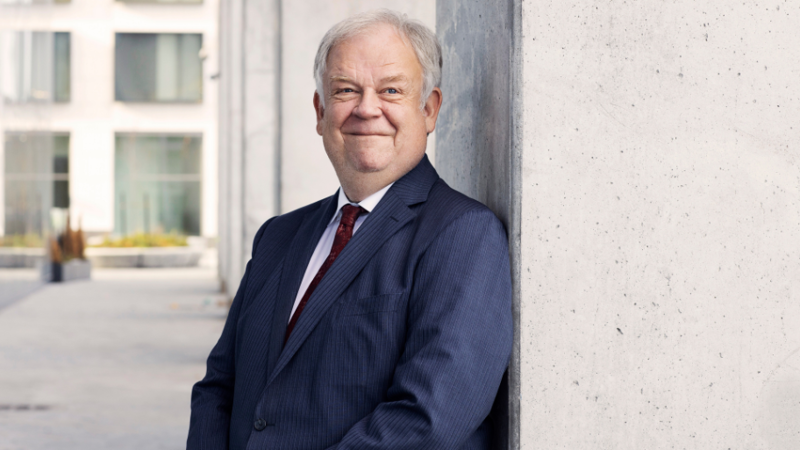6 most effective tips for managers on managing well-being at work
Companies maintain their computers, renovate their premises and have their cars serviced. These are necessities that everyone takes for granted. But the same attention is often not paid to the management of employees' well-being at work. If Terveystalo's senior occupational health psychologist Antti Aro had only one piece of advice to give to business leaders, he would urge them to look at things from the employees' point of view.

– Talking about employability is often pigeonholed as some kind of soft talk. It certainly isn't. People's intellectual and social capital is the most important asset of organisations. That capital should be kept in good condition - not allowed to decay and rust for lack of care, says Antti Aro, senior occupational health psychologist at Terveystalo.
He adds that it costs thousands of euros to hire one specialist. If a specialist is underperforming, feels unhappy and eventually changes jobs, the company loses out financially.
– People have many other things going on in their lives besides work. If you are already weak, you are less able to cope with the pressures of working life. Sick leave, early retirement, lack of cooperation and presenteeism, i.e. being there but not fully present, start to emerge, says Aro.
Interest in people is enough. Workability management should not be just a matter of filling in forms. “
Antti Aro, Senior Occupational Health Psychologist at Terveystalo
He notes that in some sectors there are more root causes of work-cycle risks than in others. In sectors where there are structural crises, the risks increase.
– For example, the risk of suffering from work-related fatigue has increased in the social services sector, which is suffering from staff shortages, and in the agricultural sector, which is struggling with a profitability crisis," says Aro.
Aro points out that structural crises have emerged over decades because they have not been addressed in a timely and proactive manner.
– The worst management option is paralysis - remaining in a state of indecision and doing nothing. Once a crisis has begun, radical action is often required. Then a little adjustment is no longer enough," he adds.
Employability issues are on the management agenda
Supporting a healthy working life does not require miracles from organisational leaders. Aro says the first step is to take work capability issues seriously and put them on the agenda. He says the biggest problem in many organisations is that HR issues are kept separate from the business.
Aro has noticed that top management often seems to be alienated by the term "work capacity".
– Perhaps they should talk about performance or functional capability instead.
Top management desks are full of urgent matters. And Aro says that managers usually only have time to study about ten percent of all the information available to them.
– But building a healthy working life deserves uncompromising attention. It is the company's responsibility to ensure that working conditions are as good as possible. It is ethically important to take care of employees - it is also an act of responsibility.
Aro encourages that the principle of capability management is simple: the manager actively monitors the situation of employees and addresses capability risks with a low threshold and without bureaucracy. Aro stresses that human management can go a long way even with basic interaction skills.
– Interest in people is enough. Work performance management should not just be a matter of filling in forms. It must be part of everyday life - involved in all decision-making," he says.
Aro gives an example: when senior management is planning a new project, it is worth considering whether the resources are such that the project can be implemented - without employees being at risk of exhaustion.
The culture, spirit and atmosphere of the workplace are of huge importance to employees' ability to work.
– A few years ago, a CEO said that his job is to enable people to live as many years as possible - not just to keep them working," says Aro.
In the ideal culture of a healthy working life, Aro says, work is as smooth as possible. There is a balance between work and leisure: sometimes the workload can be tight, but there is time to recover afterwards. A healthy workplace is managed in a human-centred and humane way," Aro continues.
– For example, in a management team meeting, it is a good idea to spend time discussing the work performance of the management team. Even 15 minutes is a generous amount of time if the discussion is regular.
Aro recommends that you talk about job satisfaction little but often - not rarely and a lot at once. He suggests starting the discussion, for example, from a future perspective: how will the coming year affect the working capacity of people working in the company? How do you ensure that everyone stays fit?
– At the same time, prepare in advance for possible challenges ahead.
Once the work performance discussion has become a regular practice, you can start asking how everyone is doing in the workplace.
– Talking openly requires psychological safety and trust between people. If there are problems of mutual trust in management, it is worth resolving them as early as possible. If they escalate, they will ultimately harm the company.
Aro stresses that the example set by top management has a powerful impact on the well-being of employees. For example, how do managers look after their own recovery after work?
Let go of the myth of heroic leaders who brag on four-hour nights and monologue leadership
One leadership style has been proven to improve employee well-being: servant leadership. According to Aro, it reduces workers' depression and anxiety and increases their sense of control and empowerment.
A servant leader is accountable, true to his word and supportive when a subordinate finds himself in a difficult situation. He or she looks after the common good and accepts the diversity of his or her subordinates. A leader gives credit to those to whom it belongs - not hoarding it for himself. Humility, authenticity and courage are the characteristics of a servant leader.
– People appreciate being genuinely consulted for their views. A leader should not seek to be an oracle who knows everything and says 'here's what we're going to do'. Today's world is so complex that monologue leadership doesn't go very far any more.
Aro argues that knowledge is becoming increasingly communal. That's why it pays to harness the power of community, swarm intelligence - collaborative thinking is effective.
Aro says that if he had to give just one piece of advice on leadership, he would:
– Look at things from an employee's perspective. If you don't have time to do this, you should change jobs.
Aro encourages managers to ask their subordinates often what things look like from their point of view.
– People appreciate being genuinely asked for their views and opinions.
Workability management is a joint effort between employers and occupational health
Occupational health can help management to manage employee performance in a systematic and strategic way. Together, they can discuss, for example, what the risks are for the organisation's workability. By proactively addressing them, companies can save money, keep their work communities healthy and their employees well.
– The biggest mistake is to think that occupational health is only brought in when problems are already well advanced. Occupational health care is most useful for prevention. The earlier risks are tackled, the better.
Aro points out that people in the workplace often have the best knowledge of how people are doing.
– The right way forward is for line managers to be alert, respond to signals of concern and encourage team members to be open if they have something on their minds.
Aro says managers don't have to do everything alone - there is support from an occupational health partner.
– Speaking up often helps to structure ideas. Leading people is not an innate trait, but a skill that can be learned.
Antti Aro's 6 tips for leaders
- Monitor key performance indicators and the data they produce.
- Take action if you get the feeling that there is a challenge in the work community. React unnecessarily and too early rather than too late. Make mini-interventions with a low threshold.
- Be aware of the state of affairs in your organisation. Don't mystify things.
- Lead by example. Be interested in issues and people - talk to everyone.
- Listen sensitively and sensitively, especially to your direct reports. Listen to the views of frontline staff too.
- Remember a constructive style. If you wonder about your subordinate's fitness for work, don't ask if he or she has mental health problems. Instead, ask: Do you have any concerns?
Read more occupational health articles

Four relaxation exercises for the whole family for the Christmas rush
Christmas can be a busy and hectic time for families with children. A moment of peace and quiet with your family is an invaluable opportunity to enjoy Christmas.

8+1 ways to improve your energy levels
Are you tired during the day or do you still have high blood pressure in the evening? Try these tips for a better state of alertness, advises doctor Sanna-Tuulia Mattilan from Terveystalo Focus Uni in Tampere.

Mental health-related absences reduced by 45% with brief psychotherapy - significant impact on other absences too
A study by Terveystalo* monitored the impact of brief psychotherapy for occupational health clients on sickness absence in 2019-2024.The study found that the use of brief psychotherapy reduced mental health-related sickness absence by 45% and other sickness absence by 19%. The study follows on from a similar study carried out 2 years ago and reinforces the importance of timely access to treatment for mental health symptoms.

3 megatrends challenge wellbeing management and productivity: 'Fear of the paranoid is ever-present for managers'
The megatrends of the working life revolution and the productivity stagnation they are contributing to can be seen as concrete phenomena in Finnish workplaces. In the midst of the turbulence, both management and employees are wondering. But with good strategic leadership and partnership, human efficiency can be achieved.

Menopause is a pricey taboo in the workplace
Are menopause the new glass ceiling? If careers are to be extended and full potential unlocked, the impact of menopausal symptoms on work ability and well-being must be taken seriously. Turning a blind eye is discriminatory and comes at a price.

Influenza, Covid-19 or just a common cold – can you tell the difference between the symptoms and when to see a doctor?
The symptoms of influenza, flu and coronavirus can be very similar. Fortunately, you can also protect yourself against influenza with a vaccine.